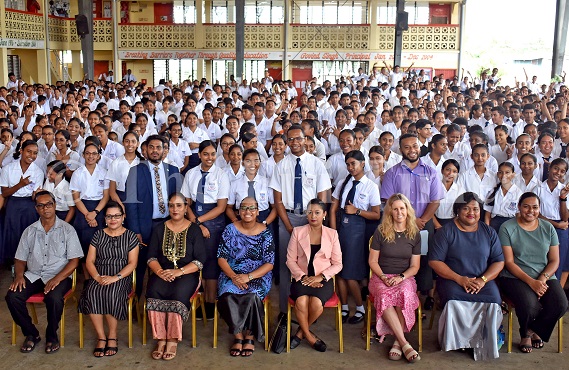Students of Rishikul Sanatan College and Bau Central College voted in a process similar to the nation general election to choose their leaders.
Students, who had not experience being part of the 2022 National General Elections, had the opportunity to vote for their school leaders through a similar process called the School Election Toolkit (SET) Pilot program.
The two schools are the first out of ten schools in the Central Division to be part of the pilot program.
The program was launched at Rishikul Sanatan College which is expected to continue next year. Fiji Elections Office (FEO), acting Supervisor of Election Ana Mataiciwa said it was a privilege for the Fiji Elections Office to work hand-in-hand with the Ministry of Education (MOE).
Ms Mataiciwa said the SET program was set-up after her office did a review of the 2022 General Election.
“One thing that was noticed, apart from the low voter turnout from our youths, was the fear and intimidation associated with the election,” she said.
She said the program was to bring back civic pride in students and to help them understand the election process before they take part in any general election.
“For Rishikul, I was informed about the processes leading up to voting.
“The candidates had campaigned and they also had their blackout period just like in the general election.
It’s good to see that the students took ownership of the process,and they made it fun and it suited the circumstances in school.
“The process was just like in the general election because we want consistency.”
Ministry of Education permanent secretary Selina Kuruleca said the SET pilot program was designed by FEO to provide a guideline on selection of school prefects using the electoral processes.
“The MOE and the FEO believe that creating awareness on the democratic processes among students is an integral component of education.
Hence, it shares a common goal of providing an insight on elections and democracy,” Ms Kuruleca said.
She said the school election also ensured that prefects were chosen based on merit and popularity among peers, rather than confidential selection criteria by teachers and administrations, which is the current practice in most schools.
Ms Kuruleca said SET would be rolled out in the 176 secondary schools around the country in 2025 and a policy on selection of school prefects would be developed by the ministry.
Rishikul Sanatan College principal Rose Sharma said it was a privilege for her school to be selected as a launch venue for the pilot program.
“The enthusiasm and excitement were felt all over the school, especially with the students going through the voting process to select their student leaders,” she said.
She said 882 students participated in the voting process at Rishikul.
“In previous years, the selection of the student council executives (president, vice president and secretary positions) was determined based on the college student council policy.
“As per the policy, the executive positions were advertised and only the Year 13 students could apply through an expression of interest.
There are certain criteria that candidates had to fulfil.
“The expression of interest was vetted by the three school administrators and the student council committee members (teachers).
“The students were then interviewed and the best candidate who met the criteria through the policy and passed the interview was selected as the president.”
She said with the pilot program the students were given a platform where they could exercise their rights, make decisions and take ownership of who they selected to lead the college student body.
“It was also educational as students from Year 9 to Year 13 witnessed, understood and were able to successfully participate in a voting process,” Ms Sharma said.
“These young students who participated, who are able to understand the voting process, can go and share the same message to their parents and community.
“So awareness is created using these young minds.”
Rishikul Sanatan College Year 13 student Timoci Nateba said the process gave a fair and equal right for him to vote.
The 18-year-old said he was excited and also confused on who he wanted to vote for, but was able to make a decision after some careful thinking.
He said he was thrilled to know the names of the candidates before one of them was to become the student council president.
Rishikul Sanatan College Year 10 student Sahi Riddhi Kumar said it was the first-time she took part in a voting process.
“At first I was petrified, but I later calmed down,” she said.
“It’s an excellent opportunity as it will help us better understand the process of voting.
It was well imitated.
It had all the process in the General Election.
I appreciate that I had a say in who is to be the student council president.”
Schools where the program would be piloted include Noco Secondary, Dilkusha Methodist High School, Suva Muslim College, Jeremiah College, Marist Brothers High School, Suva Grammar School and Adi Cakobau School.


